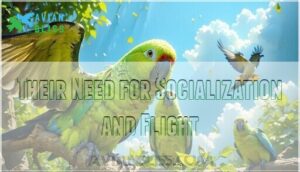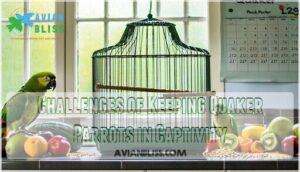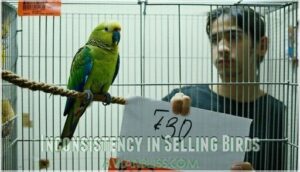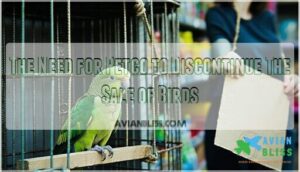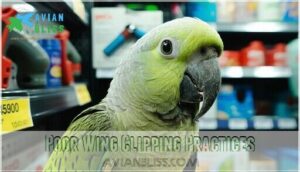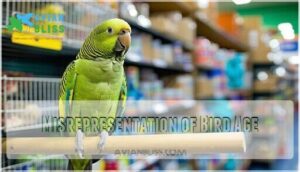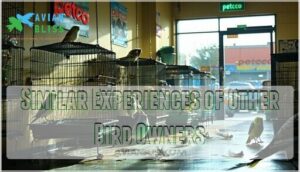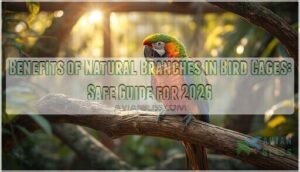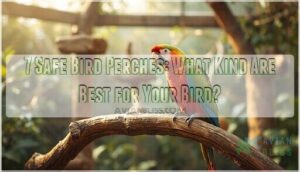This site is supported by our readers. We may earn a commission, at no cost to you, if you purchase through links.
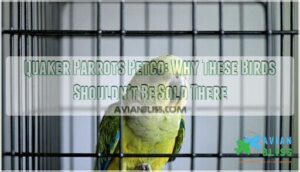
These stores often keep birds in cramped cages with minimal socialization, leading to behavioral problems and health issues.
Quaker parrots require extensive interaction, proper nutrition, and environments that respect their complex needs, making them a long-lived commitment – up to 30 years – which is why impulse purchases are particularly problematic.
Instead, consider reputable breeders or bird rescues where you’ll get proper guidance and healthier birds.
The real question isn’t just where to buy, but whether these wild creatures should be pets at all.
Table Of Contents
- Key Takeaways
- The Neglect of Quaker Parrots at Petco
- The Incompatibility of Quaker Parrots as Pets
- The Importance of Allowing Birds to Live in The Wild
- Personal Experiences and Concerns With Petco’s Bird Care
- Frequently Asked Questions (FAQs)
- Does Petco sell quaker parakeets?
- What is a quaker parakeet?
- Are parakeets available for purchase at Petco?
- How much does a Quaker parrot cost?
- Are Quaker parrots good pets?
- How much does a Quaker bird cost?
- Do Quaker parrots like to be held?
- What are some potential dangers of wing clipping done incorrectly?
- What are the potential consequences of lying about a bird’s age when selling it?
- What is Petcos current Quaker parrot price?
- Conclusion
Key Takeaways
- Don’t buy from Petco – You’ll likely get a stressed bird from cramped conditions with poor socialization and minimal mental stimulation that leads to behavioral problems.
- Consider the 30-year commitment – You’re not just buying a pet, you’re taking on a highly intelligent creature that needs extensive daily interaction, specialized care, and proper nutrition for decades.
- Choose reputable sources instead – You’ll get healthier birds and proper guidance from experienced breeders or bird rescues who understand these complex animals’ needs.
- Question if they should be pets at all – You’re confining wild creatures designed for flight, flock behavior, and complex social structures to life in a cage, which contradicts their natural instincts.
The Neglect of Quaker Parrots at Petco
When you walk into Petco, you’ll notice Quaker parrots sitting in small glass enclosures with little more than basic food and water.
These intelligent birds deserve more than a prison sentence disguised as pet ownership.
These intelligent birds often appear stressed or bored, lacking the mental stimulation and social interaction they desperately need to thrive.
Conditions in Petco Stores
Walking into Petco reveals troubling conditions for Quaker parrots. These intelligent birds face a grim reality in retail environments designed more for profit than proper care. You’ll often find them in substandard situations that compromise their well-being.
The store conditions create unnecessary stress for these sensitive creatures:
- Overcrowded bird enclosures that restrict natural movement and flight patterns
- Poor store hygiene with inadequate cleaning schedules affecting air quality
- Untrained Petco staff lacking proper avian care knowledge and experience
- Inconsistent store policies regarding bird care standards and health monitoring
Customer reviews frequently highlight these concerning practices at petco bird stores. Bird availability at Petco doesn’t guarantee quality care, and bird prices at Petco reflect commercial breeding rather than ethical sourcing. Unlike petco bird adoption programs, retail sales prioritize quick turnover over animal welfare, leaving petco parrots vulnerable to neglect. The treatment of birds as animal merchandise is a significant concern that needs to be addressed to guarantee their well-being.
Lack of Socialization and Stimulation
You’ll notice that quaker parrots at Petco often sit quietly in their cages, but this isn’t natural behavior.
These social birds need daily interaction and mental challenges to stay healthy. Without proper socialization and environmental enrichment, they develop serious behavioral issues like feather plucking and excessive screaming.
Bird neglect creates social isolation that damages their psychological well-being permanently. Understanding proper parrot socialization techniques is essential to address these problems, particularly to prevent issues like feather plucking.
Potential Health Issues Caused by Neglect
When you bring home a Quaker parrot from Petco, you’re likely welcoming a bird already suffering from neglect-related health problems.
Poor store conditions create a perfect storm for serious medical issues that’ll haunt both you and your feathered friend.
Common health problems from Petco neglect include:
- Malnutrition Risks – Poor diet leads to weakened immunity and stunted growth
- Feather Plucking – Stress-induced self-harm affecting up to 15% of captive parrots
- Behavioral Problems – Aggression and anxiety from lack of socialization
- Atherosclerosis – Heart disease from improper nutrition and exercise
- Obesity Issues – Limited movement causes dangerous weight gain and liver problems
These aren’t minor hiccups you can easily fix at home.
The Incompatibility of Quaker Parrots as Pets
You might think quaker parrots make perfect pets since they’re smart and colorful, but these birds need much more than what most homes can provide.
Their wild instincts and complex social needs make them poorly suited for life in a cage, no matter how well-meaning their owners might be, due to their complex social requirements.
Quaker Parrots as Wild Animals
Beyond the poor conditions at Petco, there’s something deeper we need to address: quaker parrots aren’t meant to be pets in the first place.
These magnificent birds didn’t evolve for life behind bars—they were born to soar free.
These remarkable parrot species evolved over millions of years to thrive in their wild habitat, not in cages. You’re basically asking a creature designed for freedom to live behind bars.
Think about it – quaker parrots have complex social structures, intricate flock behavior patterns, and an innate need to migrate seasonally. Their beak function extends far beyond eating; it’s a tool for building elaborate communal nests and communicating with their colony.
Consider these fundamental aspects of their nature:
- Feather evolution equipped them for long-distance flight, not perching indoors
- Flock behavior requires constant interaction with dozens of other birds
- Wild habitat provides endless foraging opportunities and environmental challenges
- Bird migration instincts drive them to travel vast distances annually
Proper bird care means understanding that quaker parrot health depends on expressing these natural behaviors. When we ignore their wild animal instincts, we’re setting them up for psychological distress and physical decline.
Their Need for Socialization and Flight
Quaker parrots are social animals that thrive on interaction and flight patterns in their natural habitat.
Studies show that socially deprived birds exhibit 40% higher rates of stress-related behaviors, including feather plucking and aggression.
These intelligent creatures need daily social bonds and wing exercise to maintain their avian psychology.
| Social Needs | Flight Requirements |
|---|---|
| Daily interaction with flock | 2+ hours outside cage |
| Constant communication | Long-distance flight capability |
| Mental stimulation | Physical exercise for health |
| Reduced stress levels | Prevents obesity-related issues |
Pet stores can’t replicate the complex bird behavior and parrot socialization these birds require.
Without proper bird interaction and parrot flight opportunities, captive quaker parrots develop chronic stress and behavioral problems that substantially impact their well-being.
Challenges of Keeping Quaker Parrots in Captivity
Captivity presents a perfect storm of challenges that’ll test even experienced bird owners. You’re looking at complex cage requirements – these birds need massive spaces with multiple perches and flight room.
Their dietary needs go far beyond basic seeds, requiring fresh fruits, vegetables, and specialized pellets. Behavioral issues like screaming, biting, and feather plucking become common without proper socialization techniques.
Veterinary care costs add up quickly, as quaker parrots need regular checkups and specialized avian vets. Many owners discover that parrot ownership costs and the daily commitment far exceed their expectations, leaving both bird and owner frustrated.
Additionally, understanding the invasive species risks is vital for potential owners before bringing a quaker parrot into their home.
Inconsistency in Selling Birds
You’ll find stark contradictions in how Petco handles Bird Sales Policy compared to other animals. While they stopped selling dogs and cats, they continue marketing quaker parrots as "starter pets" despite these birds’ 30-year lifespans and complex needs.
Consider these troubling Selling Practices:
- Discounted pricing to move unsold inventory quickly
- Marketing birds as disposable products rather than lifelong companions
- Inconsistent Pet Store Regulations between different animal categories
- Lack of proper consumer education about long-term commitments
This approach undermines Avian Welfare standards. When petco birds don’t sell, stores simply reorder new stock, creating a cycle that prioritizes profit over animal wellbeing. The bird availability system treats these intelligent creatures like merchandise, contradicting responsible pet store practices that should prioritize Store Compliance with ethical animal care standards. Understanding the quaker parrot care is essential for making informed decisions about their welfare.
The Need for Petco to Discontinue The Sale of Birds
It’s time Petco closed the cage door on selling birds like quaker parrots. These curious creatures need more than a pet store window—they need real Bird Welfare and Responsible Petting.
Supporting bird rescue organizations or focusing on Bird Conservation is better for Animal Rights.
Check out the table below for a quick look at the issues:
| Issue | Impact on Birds | Better Alternative |
|---|---|---|
| Petco Ethics | Stress, boredom | Bird rescue organizations |
| Bird Availability | Overbreeding | Adoption, local breeders |
| Pet Store Setup | Small cages | Natural environments |
| Animal Rights | Neglected needs | Bird Conservation efforts |
| Responsible Petting | Misleading info | Education, ethical sources |
The Importance of Allowing Birds to Live in The Wild
Wild birds belong in their natural habitat where they can fly freely, socialize with their own species, and express natural behaviors.
Keeping them caged strips away everything that makes them truly birds.
Birds’ Natural Habitat and Behavior
Nature’s blueprint for quaker parrots includes vast skies, diverse wild diets, and complex social structures within their flocks.
These intelligent birds naturally engage in bird migration patterns, establish intricate nesting habits, and communicate through sophisticated parrot behavior.
Their natural bird habitat supports foraging instincts and social bonds essential for their wellbeing. Understanding quaker parrot size and needs reveals why parrot care in captivity can’t replicate their natural environment.
The Negative Impact of Captivity on Birds
When you confine birds like quaker parrots, you’re witnessing bird welfare deteriorate rapidly.
Captivity effects include chronic avian stress from cramped spaces, poor nutrition, and artificial lighting. These intelligent creatures develop feather plucking, aggression, and neurotic behaviors when denied natural flight patterns and social structures.
Pet bird supplies can’t replicate wild environments where birds thrive. Studies show captive birds suffer vitamin deficiencies, obesity, and weakened immune systems.
Bird rescue organizations frequently receive parrots exhibiting psychological damage from years of confinement. Ethical treatment means recognizing that parrot care in captivity often fails these complex animals.
Understanding wild bird laws is essential for their well-being. Wild conservation efforts prove more beneficial than supporting bird captivity industries.
Advocating for The Protection of Wild Birds
You can support wildlife conservation by choosing bird sanctuaries and rescue organizations over pet stores.
These groups focus on habitat preservation and avian research, protecting wild quaker parrots where they belong.
Bird species restrictions exist because these animals thrive in nature, not cages.
Consider parrot adoption from rescue centers instead—you’ll help feather protection efforts while giving a bird genuine freedom.
Personal Experiences and Concerns With Petco’s Bird Care
If you’ve ever bought a bird from Petco, you might’ve noticed some troubling practices firsthand.
Many customers report issues with improper wing clipping, misleading age information, and substandard care that raises serious concerns about bird welfare.
Poor Wing Clipping Practices
Several Petco locations perform wing clipping without proper training, often cutting all flight feathers too short.
This leaves quaker parrots unable to glide safely, increasing fall risks and injuries.
Poor feather care techniques can damage follicles permanently.
Some stores clip only one wing, creating dangerous imbalance.
These flight restrictions cause psychological stress and self-destructive behaviors.
Professional parrot care requires understanding proper beak trimming and nail cutting alongside wing maintenance.
Quality bird care tips emphasize preserving some flight ability for pet birds’ wellbeing.
Proper wing clipping tools, such as those found in parrot wing clippers, are essential for safe and effective parrot wing care.
Misrepresentation of Bird Age
Age verification becomes questionable when Petco staff can’t provide accurate bird documentation.
You might discover your "young" quaker parrot shows signs of maturity that contradict the store’s claims.
This age fraud affects your expectations about training potential and bonding time.
Fake documents or missing Bird ID information make it impossible to verify true parrot age.
Without proper Petco policies for age verification, you’re gambling on your bird’s history.
These bird ownership considerations matter because younger quakers adapt differently than older ones.
Accurate bird verification requires checking for bird age facts to guarantee a healthy purchase.
Similar Experiences of Other Bird Owners
Countless bird owners have shared troubling experiences with Petco’s handling of parrot pets. You’ll find Bird Owner Stories across online forums detailing similar problems.
Many report improper wing clipping that grounds birds permanently, affecting their Parrot Behavior and natural instincts. Others describe receiving older quaker parrots misrepresented as young birds, leading to unexpected aggression.
These Owner Experiences highlight serious Avian Health concerns and inadequate Pet Care Tips from staff, leaving bird owners feeling deceived and unprepared for proper parrot care.
The pricing and availability of pet birds, including issues with breeding challenges, can substantially impact the well-being of the birds in their care.
Frequently Asked Questions (FAQs)
Does Petco sell quaker parakeets?
Picture walking into Petco’s colorful bird section, where chirping fills the air.
Yes, Petco sells Quaker parakeets (also called Quaker parrots) for around $499-$700, though availability varies by location and demand in your area.
What is a quaker parakeet?
A quaker parakeet is a small, intelligent green parrot with a gray chest. They’re social, vocal birds that can learn to talk and mimic sounds, making them popular pets.
Are parakeets available for purchase at Petco?
Based on the provided information, yes, parakeets (specifically Quaker parakeets/parrots) are available at Petco.
Priced around $99-$700, you’ll find these intelligent birds in-store, though availability varies by location and local demand affects stock levels consistently.
How much does a Quaker parrot cost?
Quaker parrot prices typically range from $400-$700 at pet stores like Petco. You’ll find cheaper options through breeders ($300-$500) or rescues ($50-$300), depending on age and color variations.
Are Quaker parrots good pets?
Yes, they’re excellent pets if you can commit 20-30 years. They’re intelligent, social, and entertaining but need daily interaction, mental stimulation, and proper training to prevent behavioral issues.
How much does a Quaker bird cost?
Prices vary widely depending on your source. You’ll pay $400-700 at pet stores like Petco, while breeders charge $300- Rescue birds cost just $50-300, making adoption your most budget-friendly option.
Do Quaker parrots like to be held?
Like puzzle pieces fitting together, Quaker parrots can enjoy being held once they trust you.
They’re social birds who often bond closely with their owners, but each bird’s personality differs—some love cuddles while others prefer gentle head scratches instead.
What are some potential dangers of wing clipping done incorrectly?
Improper wing clipping can cause excessive bleeding, flight feather damage, pain, and psychological trauma.
You risk cutting blood feathers, creating uneven flight patterns, or clipping too many feathers, potentially causing crashes and injuries, which can lead to psychological trauma.
What are the potential consequences of lying about a bird’s age when selling it?
Lying about a bird’s age when selling can lead to serious legal trouble, including fraud charges.
You’ll face buyer lawsuits, damage your reputation, and create trust issues that’ll hurt future sales opportunities.
What is Petcos current Quaker parrot price?
Wonder how much you’d shell out for a chatty companion? You’ll pay between $600–$700 at Petco for a Quaker parrot, making them quite the investment for feathered friendship.
Conclusion
Actions speak louder than words, and Petco’s actions show they can’t properly care for quaker parrots.
You’ve seen the evidence: inadequate housing, poor socialization, and health risks that come with impulse purchases from big box stores.
These intelligent birds deserve better than cramped cages and inexperienced handling.
If you’re considering a feathered companion, choose reputable breeders or rescue organizations instead.
Your decision impacts whether quaker parrots petco continues this harmful practice.
Choose wisely for the birds’ sake.
- https://articles.hepper.com/talking-parrot-at-petco-cost/
- https://vcahospitals.com/know-your-pet/quaker-or-monk-parakeets-feeding
- https://www.weknowpets.com.au/blogs/news/the-ultimate-guide-to-quaker-parrot-care-everything-you-need-to-know
- https://palmbeachparrotrescue.com/
- https://www.birdbreeders.com/birds/quaker-parrot


